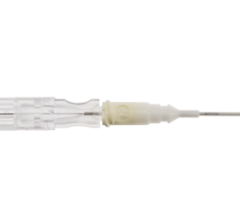
May 14, 2009 – In final, one-year results of a multicenter randomized clinical study, catheter ablation demonstrated significantly better outcomes compared to anti-arrhythmic drug (AAD) therapy for the treatment of drug refractory recurrent symptomatic paroxysmal atrial fibrillation (AF).
In a presentation during the late breaking clinical trials session at Heart Rhythm 2009, patients receiving cardiac ablation with the NaviStar ThermoCool Catheter, manufactured by Biosense Webster, Inc., were significantly more likely to be free of recurring AF after initiation of treatment and experienced fewer serious adverse events than those receiving AAD therapy.
In addition, patients receiving catheter ablation reported markedly fewer symptoms and substantially improved quality of life compared to those receiving AAD.
“The final results of this trial provide electrophysiologists and their AF patients with rigorous data demonstrating the significant benefits of catheter ablation compared to ongoing treatment with medical therapy,” said David Wilber, M.D., primary investigator of the study and the George M. Eisenberg professor of cardiovascular sciences and director, division of cardiology, Loyola University Medical Center in Maywood, Ill. “In addition, this study shows that patients report an improved quality of life following ablation therapy, which is an important measure of the benefits of catheter ablation on one’s activities of daily living.”
In addition to his role as primary investigator, Dr. Wilber is compensated for his services as a member of the company’s scientific advisory board and provides other consulting services.
Biosense Webster said it is pleased that the complete one-year post-ablation results of this trial further substantiate the safety and effectiveness of ablation with the NaviStar ThermoCool Catheter in patients with AF. Date demonstrate that 63 percent of the ablation patients in this study remained free of any observed atrial arrhythmia during the evaluation period, not just symptomatic AF recurrence, verses only 17 percent of those treated with AADs.
This clinical trial was a randomized, unblinded and controlled evaluation of symptomatic, paroxysmal AF patients who were refractory to at least one AAD and had at least three episodes of AF in the six months prior to randomization. A total of 167 patients were enrolled from 19 sites throughout the world and the primary effectiveness endpoint (chronic success) was freedom from documented symptomatic AF recurrence following procedural endpoint confirmation and absent new AAD use or repeat ablation outside of protocol-defined criteria.
Chronic success was achieved by 66 percent for patients receiving NaviStar ThermoCool Catheter ablation at the end of the study effectiveness evaluation period, which is significantly superior (p
Additionally, the NaviStar ThermoCool Catheter ablation group demonstrated an excellent safety profile with no device-related serious adverse events such as death, heart attack, stroke, cerebrovascular accident, heart block or atrial perforation within seven days post ablation. Importantly, there was no clinically significant pulmonary vein stenosis in patients receiving ablation, and the incidence of serious adverse events in the ThermoCool Catheter group was observed to be approximately half that in the AAD group (5 vs. 9 percent).
The NaviStar ThermoCool Catheter and the EZ Steer ThermoCool/NAV Catheter are the only ablation catheters approved by the FDA for the treatment of drug refractory recurrent symptomatic paroxysmal atrial fibrillation when used with compatible 3D electroanatomic mapping systems.
The NaviStar ThermoCool Catheter is also approved in the U.S. for the treatment of type 1 atrial flutter, and recurrent drug/device refractory sustained monomorphic ventricular tachycardia due to prior myocardial infarction (heart attack), two types of cardiac arrhythmia.
For more information: www.biosensewebster.com


 October 28, 2025
October 28, 2025 









